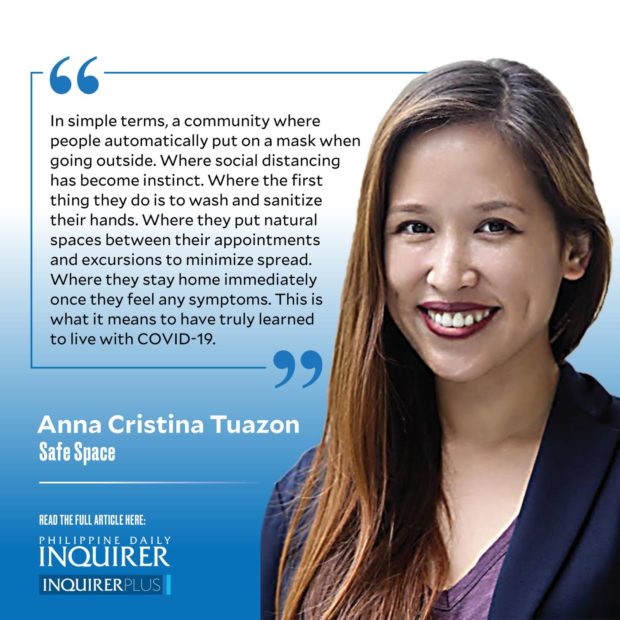Life must go on
Filipinos are starting to feel some hope. Alert levels remain low, some cities have actually zeroed out on active COVID-19 cases, and the national numbers are slowly but steadily decreasing. Some people feel uneasy with celebrating this, fearing that it might lead others to drop safety behaviors completely and act recklessly. However, in a time of great suffering and uncertainty, we should celebrate every win we get. Not knowing how the Omicron variant will affect our country in the near future, all the more we should savor this little — even if temporary — respite from the relentlessness of the pandemic.
When risk is low, the true test begins: Can we start resuming our lives without causing case spikes? Can we begin to shift our attention back to our pursuit of joy and love (and our livelihoods) without COVID-19 at the forefront? Can we relax without being complacent? Can we finally spend the holidays with our loved ones and just revel in our social connection without risking our lives?
There are serious discussions among scientists that we may never be able to truly eradicate COVID-19 but that we hope for it to go the way of the common cold: it will continue to exist but decrease in its fatality and severity until it is easily managed. If this is the case, then severe restrictions and travel bans cannot be the sole solution—these are ultimately temporary stop gaps because, at some point, international travel and commerce must resume. Weddings and birthdays must be celebrated. Schools and businesses must open. Life must go on. The true solution, therefore, lies in translating safety protocols into long-lasting, self-sustaining behavioral change of the public. As in parenting, you can’t ground your adolescents or stop them from going out of the house forever. It is a much better parenting practice to ensure instead that our children have the skills to safely navigate the world outside of our homes.
Let me share with you how to create enduring behavioral change. In skills-based psychotherapy, we hold intensive regular sessions that put structure and support in our clients’ lives. In this containing environment, we actively teach coping skills that would help them achieve the quality of life that they want. We strengthen these skills through practice and encourage generalization by having our clients apply these skills in the real world outside of our sessions. Genuine growth happens outside of the therapy room when clients are able to integrate learned skills in the real world. Once clients seem to have regained a sense of balance and regulation, with fewer and fewer unsolvable crises, we start the weaning process. We put our therapeutic gains to the test—can they go for two weeks without therapy? How about a month? Eventually, once they can prevent and manage crises on their own, we consider them to have fully integrated effective skills that can minimize distressing symptoms so they can focus on enjoying their lives. We cannot know if therapy truly works until we’ve stopped it.
Relating this to public health, lockdowns and restrictions are the hyper-structured environment that buys us time so that we can safely learn to adapt to the pandemic. We learn safety habits that help us navigate being around others without contributing to the spread of the virus. Hyper-structured environments, however, require too many resources and come at the cost of other aspects of life that eventually we would need something more sustainable. Thus, can safety behaviors be generalized enough that people will continue to do them even as we lift mandates and restrictions? If people stop wearing masks and social distancing the moment rules are lifted, it means that people did not see the inherent value of such behaviors. What we had was mere compliance, not learning.
The true test for when we know that we have, as a society, adapted successfully to COVID-19 is the period between lockdowns and restrictions. The true balance we are looking for is where people have habituated to safety practices that will keep exposure and infection low even as mandates and restrictions have been removed. In simple terms, a community where people automatically put on a mask when going outside. Where social distancing has become instinct. Where the first thing they do is to wash and sanitize their hands. Where they put natural spaces between their appointments and excursions to minimize spread. Where they stay home immediately once they feel any symptoms. This is what it means to have truly learned to live with COVID-19.





















